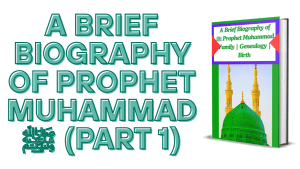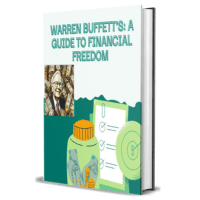
Introduction
Prophet Muhammad ﷺ, the final messenger of Allah, was born in the 6th century in the Arabian Peninsula. His early life played a vital role in shaping his leadership, wisdom, and prophetic mission. This biography explores his noble lineage, childhood, and accomplishments before prophethood. Understanding these formative years provides insight into how he was prepared for his divine role as the Seal of the Prophets (Khatam al-Nabiyyin).
I. Understanding Biography and the Arabian Context
What is a Biography?
A biography is a detailed account of a person’s life, including their experiences, accomplishments, and influences. In Islamic tradition, the Seerah (life story) of Prophet Muhammad ﷺ serves as a guiding light for Muslims, offering lessons in morality, leadership, and devotion to Allah.
Arabia and Its Regions
The Arabian Peninsula
The Arabian Peninsula, a vast desert land, was home to many tribes and civilizations. Despite its harsh climate, it became a center for trade and religious pilgrimage due to the Kaaba in Makkah.
The Hijaz Region
The Hijaz is a mountainous region in western Arabia, home to the two holiest cities in Islam:
- Makkah Mukarramah – The birthplace of Prophet Muhammad ﷺ and the location of the Kaaba.
- Madinah Munawwarah – The city where he migrated and established the first Islamic state.
Why Was the Final Prophet ﷺ Sent to Arabia?
Prophet Muhammad ﷺ was chosen to be the last messenger in Arabia due to several reasons:
- The region was culturally influential and had connections with surrounding civilizations.
- The Kaaba, built by Prophet Ibrahim (عليه السلام), was already a center of worship.
- The Arabian society had fallen into moral corruption, and divine guidance was needed to reform it.
II. Pre-Islamic Arabian Society
Political Structure of the Arabs
Arabia was divided into tribal societies, where loyalty to one’s tribe was paramount. The Quraish, the leading tribe of Makkah, held great influence due to their role as custodians of the Kaaba.
The Moral Condition of the Arabs
Before Islam, the Arabian society was marked by:
- Idol worship and polytheism.
- Tribal warfare and blood feuds.
- Injustice toward women, including the practice of female infanticide.
- Economic exploitation, where the poor were oppressed by the wealthy.
The Descendants of Prophet Ibrahim (عليه السلام)
Prophet Muhammad ﷺ descended from Prophet Ibrahim (عليه السلام) and his son Prophet Ismail (عليه السلام). The Quraish tribe, including the Banu Hashim clan, traced their lineage back to Ismail (عليه السلام), who had settled in Makkah.
The Children of Hazrat Ismail (عليه السلام)
The children of Prophet Ismail (عليه السلام) multiplied and formed various Arab tribes. The Quraish tribe, to which Prophet Muhammad ﷺ belonged, was one of the most prominent and respected among them.
III. How to Study the Seerah of Prophet Muhammad ﷺ
Studying the Seerah (biography) of the Prophet ﷺ requires:
- Understanding historical context – The culture, politics, and society of pre-Islamic Arabia.
- Reading authentic sources
- Applying lessons – The Prophet’s ﷺ life teaches patience, leadership, and devotion to Allah.
IV. The Family and Lineage of Prophet Muhammad ﷺ
The Family Circumstances
Prophet Muhammad ﷺ was born into the Banu Hashim clan, a noble family of the Quraish. Though respected, his family was not wealthy. His early life was filled with both blessings and hardships.
Genealogy of Prophet Muhammad ﷺ
The Prophet’s ﷺ noble lineage can be traced back to Prophet Ibrahim (عليه السلام):
Muhammad ﷺ ibn Abdullah ibn Abdul Muttalib ibn Hashim ibn Abd Manaf ibn Qusayy ibn Kilab ibn Murrah ibn Ka’b ibn Lu’ayy ibn Ghalib ibn Fihr ibn Malik ibn Al-Nazr ibn Kinana ibn Khuzaymah ibn Mudrikah ibn Ilyas ibn Mudar ibn Nizar ibn Ma’ad ibn Adnan.
Family Nobility and Social Standing
- His grandfather, Abdul Muttalib, was a leader of the Quraish and rediscovered the Zamzam well.
- His father, Hazrat Abdullah (رضي الله عنه), was known for his character but passed away before the Prophet’s ﷺ birth.
- His mother, Hazrat Amina (رضي الله عنها), came from the Banu Zuhra tribe.
The Faith of the Prophet’s ﷺ Parents
Islamic scholars debate whether the Prophet’s ﷺ parents followed pure monotheism. However, they were noble and righteous individuals, chosen to be the parents of the final messenger.
The Manifestation of Prophethood’s Blessings
Even before his birth, there were signs of his prophethood, including:
- The defeat of Abraha’s army when he tried to destroy the Kaaba (Year of the Elephant).
- The pure character and reputation of his ancestors.
V. Childhood and Early Years
The Blessed Birth
Prophet Muhammad ﷺ was born in 570 CE, in the Year of the Elephant, in Makkah Mukarramah. His birth was considered a moment of great blessing for humanity.
Early Nurturing and Foster Care
- As per Arab tradition, he was nursed by Halima Saadia (رضي الله عنها) in the desert for a healthier upbringing.
- Halima witnessed barakah (divine blessings) in her household after taking care of the Prophet ﷺ.
Important Events in His Childhood
- Opening of His Chest – Angel Jibreel (عليه السلام) purified his heart at a young age.
- Death of His Mother – Hazrat Amina (رضي الله عنها) passed away when he was six.
- Guardianship by His Grandfather – Abdul Muttalib cared for him but passed away two years later.
- Care Under Abu Talib – His uncle, Abu Talib, became his protector and guardian.
The Meaning of “Ummi”
The title “Ummi”, often translated as “unlettered,” means the Prophet ﷺ did not receive formal education. However, this was not a limitation; rather, it was proof that his knowledge came directly from Allah.
The Journey to Syria and Meeting Bahira the Monk
During a trade journey with his uncle Abu Talib, the Prophet ﷺ met a Christian monk, Bahira, who recognized signs of prophethood in him and predicted his great future.
VI. Pre-Prophetic Accomplishments
Participation in the War of Fujjar
At 15, he witnessed the War of Fujjar, a tribal conflict. Though he did not fight, he supported his uncle, demonstrating his commitment to justice.
Hilf al-Fudul: A Pact for Justice
The Prophet ﷺ joined Hilf al-Fudul, a pact that ensured the protection of the oppressed, showing his dedication to fairness.
Marriage to Hazrat Khadijah (رضي الله عنها)
His honest and noble character impressed Hazrat Khadijah (رضي الله عنها), a respected businesswoman. She proposed marriage, and their union was one of love, support, and trust.
Rebuilding of the Kaaba
When the Kaaba was being reconstructed, the Quraish quarreled over who would place the Black Stone (Hajr al-Aswad). Prophet Muhammad ﷺ wisely resolved the dispute by allowing all leaders to participate, proving his leadership and wisdom.
Conclusion
The early life of Prophet Muhammad ﷺ was marked by divine protection, noble character, and remarkable wisdom. These qualities prepared him for his prophetic mission, which would soon change the course of history.
FAQs – A Brief Biography of Prophet Muhammad ﷺ (Part 1)
1. What is the significance of Prophet Muhammad’s ﷺ lineage?
Prophet Muhammad ﷺ descended from Prophet Ibrahim (عليه السلام) through Prophet Ismail (عليه السلام). His lineage highlights his connection to monotheism and fulfills the prophecy of a final messenger coming from Ibrahim’s descendants.
2. Why was Arabia chosen as the birthplace of the final prophet ﷺ?
Arabia was chosen due to its strategic location, being a trade and cultural hub. Additionally, Makkah housed the Kaaba, originally built by Prophet Ibrahim (عليه السلام), making it an important center of worship.
3. How was the society of pre-Islamic Arabia?
Pre-Islamic Arabia was characterized by:
- Idol worship and polytheism
- Tribal conflicts and blood feuds
- Mistreatment of women, including female infanticide
- Economic and social injustices
Islam came to reform this society and establish justice, equality, and monotheism.
4. What is the significance of Hilf al-Fudul?
Hilf al-Fudul was a pact formed by Makkans to protect the oppressed and ensure justice. Prophet Muhammad ﷺ actively participated in it, showing his early commitment to fairness and human rights.
5. Why is Prophet Muhammad ﷺ called “Al-Sadiq” and “Al-Ameen”?
Even before prophethood, he was known as Al-Sadiq (The Truthful) and Al-Ameen (The Trustworthy) due to his honesty in dealings, fairness in judgment, and kindness in interactions.
6. How did Prophet Muhammad ﷺ meet Hazrat Khadijah (رضي الله عنها)?
Hazrat Khadijah (رضي الله عنها) was a wealthy businesswoman who hired him for trade. She was deeply impressed by his honesty and integrity, which led her to propose marriage.
7. What was the significance of rebuilding the Kaaba?
When the Kaaba was being reconstructed, tribal leaders quarreled over who would place the Black Stone (Hajr al-Aswad). Prophet Muhammad ﷺ wisely resolved the dispute by allowing all leaders to participate, proving his leadership and wisdom.
8. Why was Prophet Muhammad ﷺ sent to live with a foster family?
Arab noble families sent their children to the desert to be raised in a pure and healthy environment. Prophet Muhammad ﷺ was cared for by Halima Saadia (رضي الله عنها), who experienced many blessings after taking him in.
9. What was the significance of the “Opening of His Chest” incident?
As a child, Angel Jibreel (عليه السلام) opened the Prophet’s ﷺ chest, removed a small impurity, and purified his heart. This event symbolized his divine preparation for future prophethood.
10. What were the early signs of his prophethood?
Several signs indicated his special status, including:
- His birth in the Year of the Elephant when Abraha’s army failed to destroy the Kaaba.
- The wisdom, honesty, and fairness he displayed from a young age.
- The prophecy of Bahira the monk, who recognized him as the future prophet.


